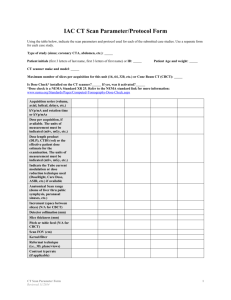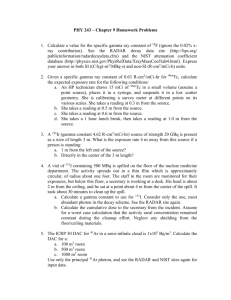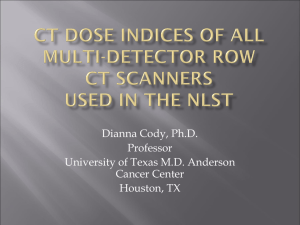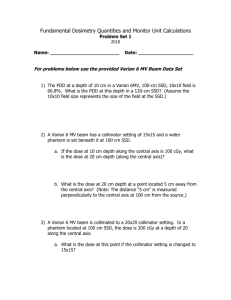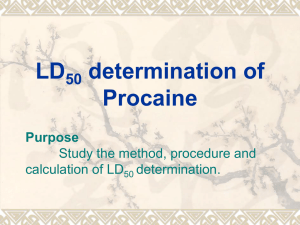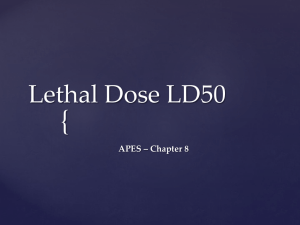201 intersecting beams
advertisement
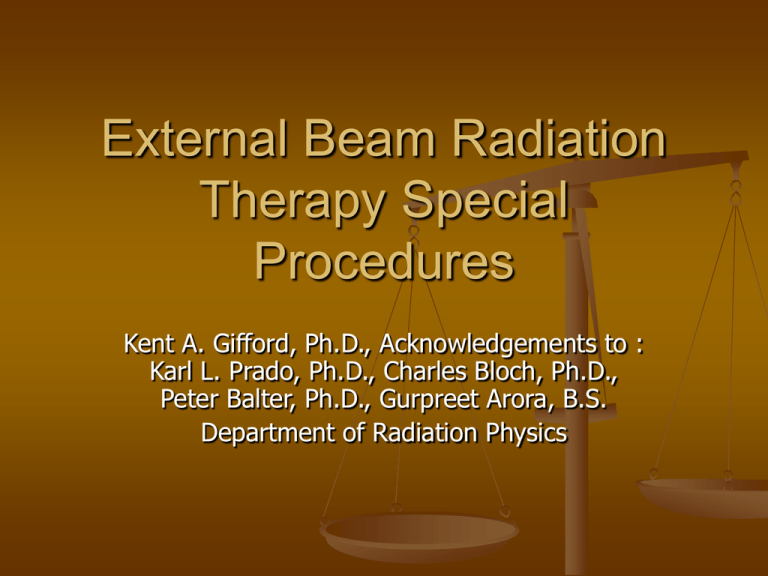
External Beam Radiation Therapy Special Procedures Kent A. Gifford, Ph.D., Acknowledgements to : Karl L. Prado, Ph.D., Charles Bloch, Ph.D., Peter Balter, Ph.D., Gurpreet Arora, B.S. Department of Radiation Physics Total Body Irradiation Indications Techniques Dosimetry Data Examples TBI: Clinical Indications Preparation for marrow or stem-cell implantation Suppress immune system to prevent rejection Rid body of tumor cells not reached by chemotherapeutic agents (e.g. CNS) TBI Techniques AAPM Report 17, figure 1. source moves horizontally single source, long SSD half body, direct and oblique fields patient moves horizontally half body, adjacent direct fields TBI Techniques AAPM Report 17, figure 1. two vertical beams four sources single source, short SSD two horizontal beams head rotation MDACC “Classic” TBI MDACC TBI Techniques: Mick-Radio Nuclear Stand Total Skin Irradiation High Dose-Rate Total Skin Electron (HDTSE-) Treatment: Technique Description Indications Methodology Data / Calculation Dose Verification (TLD) MDACC TSEI technique (modified Stanford technique) 2 angled beams (90°±23°) for uniform coverage and reduced total body dose patient is 25 cm behind lucite plate improved dose uniformity (6 fields w/plate 8 fields w/o plate, Holt JG, Perry DJ. Med. Phys. 9:769-776(1982)) increased dose to self shielded areas by diffusion 6 positions, every 60° MDACC TSEI technique (modified Stanford technique) 1st day of cycle 2nd day of cycle laser ANT RPO POST LPO LAO RAO Stanford dual beam technique feet straight ahead or pointed slightly outwards for better balance elbows at or above shoulder level arms parallel to the scatter plate QA - Patient TLD’s TLD’s are taped to the patient’s skin and irradiated for one cycle (12 beams) reference TLD’s are irradiated using a 10x10 cm2 field of 9 MeV electrons at 2.0 cm depth (100 cm SSD) in an acrylic phantom SRS: Available Systems Gamma Knife Radionics Xknife/Xplan Brainlab Cyberknife Others (many “homemade”) Delivery techniques 201 intersecting beams (Gamma Knife) Arcs with circular collimators (1-4 cm) spherical dose distributions ellipsoid dose distributions Multiple fields, shaped with miniature MLC arbitrary dose distributions IMRT Stereotactic Radiosurgery Elimination of motion & setup errors means smaller field size can be used Reduction in field size allows higher dose per fraction, and reduction in number of fractions (1 to 5) Large dose to small lesions with minimal dose to surrounding tissue. Single fraction “Out-of-town” patients Patients in poor health Other patients who might be burdened by protracted treatment. Bloch, Ph.D. SRS QA Treatment Typically 5 arcs, about 60 degree each. 5-10 MU/degree 300 - 600 MU/arc. 300 MU/min 1-2 minutes per arc. Total treatment is 5-10 min of beam time. Room entries between arcs to move couch and re-check patient alignment. Gating Study-Left Breast By Gurpreet Arora, B.S. PROBLEM: Thoracic tumors move Planning on the three CT sets CT at Inspiration CT at Expiration CT during Free Breathing Combined to form ITVs By Peter Balter, Ph.D. and Lei Dong, Ph.D. The GE system for 4D scanning GE PET/CT (can be used on any GE CT scanner) Uses Varian RPMto monitor respiration By Peter Balter, Ph.D.
